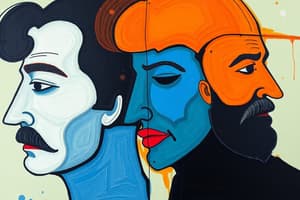Podcast
Questions and Answers
What does the Id in Freud's theory represent?
What does the Id in Freud's theory represent?
- The emotional aspect of personality
- The instinctual aspect of personality (correct)
- The rational aspect of personality
- The moral aspect of personality
Which of the following is not one of Freud's three components of personality?
Which of the following is not one of Freud's three components of personality?
- Ego
- Id
- Consciousness (correct)
- Superego
At which stage of psychosexual development do infants achieve gratification through oral activities?
At which stage of psychosexual development do infants achieve gratification through oral activities?
- Phallic stage
- Anal stage
- Latency stage
- Oral stage (correct)
What principle does the Ego operate according to?
What principle does the Ego operate according to?
Which statement about the Superego is accurate?
Which statement about the Superego is accurate?
What is the primary focus during the Anal stage of Freud's psychosexual development?
What is the primary focus during the Anal stage of Freud's psychosexual development?
At what age does Freud's Oral stage typically begin?
At what age does Freud's Oral stage typically begin?
How many psychosexual stages did Freud propose?
How many psychosexual stages did Freud propose?
What occurs during the phallic stage of development?
What occurs during the phallic stage of development?
What significant development happens in the latency stage?
What significant development happens in the latency stage?
In Kohlberg's theory, what is one of the main categories of moral reasoning?
In Kohlberg's theory, what is one of the main categories of moral reasoning?
What do the Oedipus and Electra complexes involve?
What do the Oedipus and Electra complexes involve?
According to Piaget, what should be the principal goal of education?
According to Piaget, what should be the principal goal of education?
What does the zone of proximal development focus on?
What does the zone of proximal development focus on?
What did Bronfenbrenner emphasize in his ecological theory?
What did Bronfenbrenner emphasize in his ecological theory?
Which stage of development focuses on adult experiences of sexual pleasure?
Which stage of development focuses on adult experiences of sexual pleasure?
Study Notes
Freud's Theory of Personality
- Personality comprises three components: Id, Ego, and Superego.
- Id: Instinctual part of personality driven by the pleasure principle.
- Ego: Rational part that governs and controls instincts according to the reality principle.
- Superego: Moral component, formed from internalized societal and parental values.
Consciousness Levels
- Conscious: Awareness of current thoughts and actions.
- Pre-conscious: Contains accessible thoughts that can be readily recalled.
- Unconscious: Contains thoughts and feelings not directly accessible but influences behavior.
Freud's Psychosexual Stages of Development
- Oral Stage (Birth - 2 years): Pleasure through oral activities such as sucking.
- Anal Stage (2 - 3 years): Child learns to manage societal demands.
- Phallic Stage (3 - 7 years): Awareness of gender differences and sexuality.
- Latency Stage (7 - 11 years): Resolving Oedipus and Electra complexes and developing same-sex identification.
- Genital Stage (11 years - Adult): Focus on mature sexual relationships.
Oedipus and Electra Complexes
- Oedipus Complex: Boys' attraction to mothers and jealousy towards fathers.
- Electra Complex: Girls' attraction to fathers and jealousy towards mothers.
Piaget's Goal of Education
- Education should cultivate innovative individuals capable of independent thought, not just replication of past knowledge.
Stages of Cognitive Development
- Cognitive development unfolds in stages, emphasizing the importance of active learning and adaptation.
Erikson's Psychosocial Development
- Healthy children will thrive if adults demonstrate integrity and embrace life, reducing fear of death.
- Outlines eight stages addressing key conflicts across the lifespan.
Kohlberg's Theory of Moral Development
- Individuals progress through six stages of moral reasoning categorized into three levels: pre-conventional, conventional, and post-conventional.
Vygotsky's Zone of Proximal Development
- Educational approaches should focus on students' potential development rather than just their current abilities.
Bronfenbrenner's Ecological Theory
- Emphasizes the multidimensional influences on a child’s development from different environments, indicating that development is affected by a range of systems, from immediate family to broader society.
Conclusion
- Theories of development by Freud, Piaget, Erikson, Kohlberg, Vygotsky, and Bronfenbrenner provide a comprehensive understanding of human growth encompassing personality, cognitive, social, and moral dimensions.
Studying That Suits You
Use AI to generate personalized quizzes and flashcards to suit your learning preferences.
Related Documents
Description
Explore Freud's essential concepts of personality, including the Id, Ego, and Superego. Additionally, dive into the levels of consciousness and the stages of psychosexual development. Test your understanding of these foundational elements of psychoanalysis.




